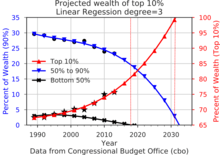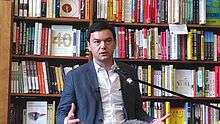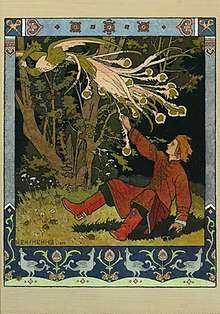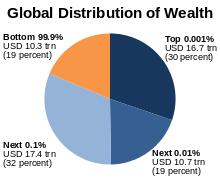
The first man who, having enclosed a piece of land, thought of saying ‘This is mine’ and found people simple enough to believe him, was the true founder of civil society. How many crimes, wars, murders; how much misery and horror the human race would have been spared if someone had pulled up the stakes and filled in the ditch and cried out to his fellow men: ‘Beware of listening to this impostor. You are lost if you forget that the fruits of the earth belong to everyone and the earth itself belongs to no one!” ~ Jean-Jacques Rousseau
Economic inequality refers to how economic goods are distributed among individuals in a group, among groups in a population, or among countries.
A
- That unequal should be given to equals, and the unlike to those who are like, is contrary to nature, and nothing which is contrary to nature is good.
- Aristotle, Politics, 1325b, in Basic Works of Aristotle (2001), p. 1282
B
- ...Five steps for saving America's capitalist system:
- America needs leaders at the top that proclaim the current state of inequality to be nothing less than a national emergency.
- A bipartisan committee should work on developing new means of redistribution and community development.
- Those leaders must be held accountable to statistics that measure the progress of their reforms.
- Resources need to be redistributed for the purpose of providing equal opportunity to the vast majority of Americans. This can be done through increasing taxes on the wealthy, further taxing societally harmful things like pollution, and develop public-private partnerships that link business goals with societal goals.
- Coordinate fiscal and monetary policy (i.e. increase cooperation among the Federal Reserve, Congress, and the White House).
C
- The fact is, people work hard and rely on Food Stamps—or SNAP Program—to be able to feed their families. When they work full-time they still live in poverty. That's wrong in our nation. Students who are losing hope because of the difficulty of finding jobs in this tough economy. What we need to do, what is best for America, is to raise wages, create jobs, and then we will move forward. Hard-working people are trying their best, but those who hold on to capital are not sharing the wealth, and there is the problem.
- Simone Campbell, interviewed by Al Sharpton, "Nun Responds To Hannity's 'Communist' Comparison: 'Name Calling Is About All That Exists On That Side'," Media Matters for America video, 4:12, April 21, 2014.
D
While most Americans think of the US as being a country of great economic mobility and opportunity, its economic mobility rate is now one of the worst in the developed world. ~ Ray Dalio
- While most Americans think of the US as being a country of great economic mobility and opportunity, its economic mobility rate is now one of the worst in the developed world.
- Ray Dalio in Hedge fund billionaire Ray Dalio says capitalism is failing America, and we need to take 5 specific actions to save it, by Richard Feloni, Business Insider, (4 April 2019)
- Social distinctions may be founded only upon the general good.
F
Human rights are not only violated by terrorism, repression or assassination, but also by unfair economic structures that create huge inequalities. ~ Pope Francis
- Human rights are not only violated by terrorism, repression or assassination, but also by unfair economic structures that create huge inequalities.
- Pope Francis, criticizing the government of Néstor Kirchner, former President of Argentina, in 2009, as quoted in "Pope Francis: the humble pontiff with practical approach to poverty" by Mark Rice-Oxley, in The Guardian (13 March 2013)
- Some people continue to defend trickle-down theories which assume that economic growth, encouraged by a free market, will inevitably succeed in bringing about greater justice and inclusiveness in the world. This opinion, which has never been confirmed by the facts, expresses a crude and naïve trust in the goodness of those wielding economic power and in the sacralized workings of the prevailing economic system.
- Pope Francis, "The Joy of the Gospel" (2013), Section 54
- While the earnings of a minority are growing exponentially, so too is the gap separating the majority from the prosperity enjoyed by those happy few. This imbalance is the result of ideologies which defend the absolute autonomy of the marketplace and financial speculation. Consequently, they reject the right of states, charged with vigilance for the common good, to exercise any form of control. A new tyranny is thus born, invisible and often virtual, which unilaterally and relentlessly imposes its own laws and rules. Debt and the accumulation of interest also make it difficult for countries to realize the potential of their own economies and keep citizens from enjoying their real purchasing power. To all this we can add widespread corruption and self-serving tax evasion, which have taken on worldwide dimensions. The thirst for power and possessions knows no limits. In this system, which tends to devour everything which stands in the way of increased profits, whatever is fragile, like the environment, is defenseless before the interests of a deified market, which become the only rule.
- Pope Francis, "The Joy of the Gospel" (2013), Section 56
H
- If it could be shown that the great Trust magnate or the great Aristocratic landowner, apart from the advantages of his inherited wealth, was a more highly developed species of humanity than the poor struggling sempstress or the unemployed docker, then there might be some justification for allowing the docker and the sempstress as the representatives of a weaker class to die out in order to enable the more highly developed creature to survive; but one moment's reflection will show that the alleged superiority of the landowner or the Trust magnate rests on one fact alone, namely, that he owns certain material possessions, usually inherited, which enable him to dictate the terms upon which his less fortunate fellow creatures shall be permitted to live.
- Keir Hardie, From Serfdom to Socialism (1907), pp. 4-5
K
- Now our struggle is for genuine equality, which means economic equality. ... What does it profit a man to be able to eat at an integrated lunch counter if he doesn't earn enough money to buy a hamburger and a cup of coffee?
- Martin Luther King, Jr., in The Radical King, p. 249.
L
- The measures adopted by the Commune and emphasized by Marx are particularly noteworthy, viz., ... the reduction of the remuneration of all servants of the state to the level of "workman's wages." ... Circumstances can (and must) strip those functions of every shadow of privilege, of every semblance of "official grandeur."
- Vladimir Lenin, The State and Revolution (1917), in Essential Works of Lenin (1966), pp. 301-302
M

A superabundance of actual wealth in the hands of the few must create hunger, typhus, and other epidemics among the many. The injustice - yea the idiocy - of this state of affairs is evident. The money-bags of course merely shrug their shoulders. This they will continue to do until a rope well tied over their shoulders will end all further shrugging. ~ Johann Most
- When increase of production is accompanied by an augmented pauperization of the masses, consumption must simultaneously decrease, stagnation and crises must ensue. A superabundance of actual wealth in the hands of the few must create hunger, typhus, and other epidemics among the many. The injustice - yea the idiocy - of this state of affairs is evident. The money-bags of course merely shrug their shoulders. This they will continue to do until a rope well tied over their shoulders will end all further shrugging.
- Johann Most, The Beast of Property (1884)
N
- Not only do we have no real right to the things of the world, because belonging always essentially to God they can never belong to creatures; but we are also limited by the laws of God in the use of those possessions; for it must not be imagined that God gives them to us so that we may dispose of them as we wish. He is too just to have made such an unequal distribution. These goods being the means destined by his Providence for the subsistence of men, he gives to some more than they need only so that they may distribute it to others. A rich man, in so far as he is rich, is thus no more than steward of God's good things.
- Pierre Nicole, Essais de Morale (1753), XII, p. 371, as quoted in The Bourgeois: Catholicism vs. Capitalism in Eighteenth-Century France (1968), p. 141
P

When the rate of return on capital exceeds the rate of growth of output and income, as it did in the nineteenth century and seems quite likely to do again in the twenty-first, capitalism automatically generates arbitrary and unsustainable inequalities that radically undermine the meritocratic values on which democratic societies are based. ~ Thomas Piketty

Austerity, inequality and job insecurity are bad for mental health and governments should counteract them if they want to face up to the rising prevalence of mental illness. ~ Dainius Pūras
- When the rate of return on capital exceeds the rate of growth of output and income, as it did in the nineteenth century and seems quite likely to do again in the twenty-first, capitalism automatically generates arbitrary and unsustainable inequalities that radically undermine the meritocratic values on which democratic societies are based.
- Thomas Piketty, Capital in the Twenty-First Century (2013), p. 1
- Whenever the rate of return on capital is significantly and durably higher than the growth rate of the economy, it is all but inevitable that inheritance (of fortunes accumulated in the past) predominates over saving (wealth accumulated in the present). ... The inequality r > g in one sense implies that the past tends to devour the future: wealth originating in the past automatically grows more rapidly, even without labor, than wealth stemming from work, which can be saved. Almost inevitably, this tends to give lasting disproportionate importance to inequalities created in the past, and therefore to inheritance.
- Thomas Piketty, Capital in the Twenty-First Century (2013), p. 377
- Austerity, inequality and job insecurity are bad for mental health and governments should counteract them if they want to face up to the rising prevalence of mental illness.
- Dainius Pūras in "Austerity and inequality fuelling mental illness, says top UN envoy", by Mark Rice-Oxley, The Guardian, (24 June 2019)
- In an exclusive interview with the Guardian to coincide with a hard-hitting report to be delivered to the UN in Geneva on Monday, Dr Dainius Pūras said measures to address inequality and discrimination would be far more effective in combatting mental illness than the emphasis over the past 30 years on medication and therapy.
“This would be the best ‘vaccine’ against mental illness and would be much better than the excessive use of psychotropic medication which is happening,” said Pūras, who as the UN’s special rapporteur on health reports back to the UN human rights council in Geneva.- Dainius Pūras in "Austerity and inequality fuelling mental illness, says top UN envoy", by Mark Rice-Oxley, The Guardian, (24 June 2019)
Q
- At the time of the Prophet's call to risalah, Arab society was devoid of proper distribution of wealth and devoid of justice. A small group monopolized all wealth and commerce, which increased through usury. The great majority of the people were poor and hungry. The wealthy were also regarded as noble and distinguished, and the common people were not only deprived of wealth but also of dignity and honor.
It can be said that Muhammad—peace be on him—was capable of starting a social movement, declaring war against the class of nobles and the wealthy, taking away their wealth and distributing it among the poor.
- Sayyid Qutb, Milestones (1964), pp. 14-15
R

The way to combat Communism is not war. What is needed in addition to such armaments as will deter Communists from attacking the West, is a diminution of the grounds for discontent in the less prosperous parts of the non-communist world. ...Communism is a doctrine bred of poverty, hatred and strife. Its spread can only be arrested by diminishing the area of poverty and hatred. ~ Bertrand Russell
- Social and economic inequalities are to be arranged so that they are both (a) reasonably expected to be to everyone's advantage, and (b) attached to positions and offices open to all.
- John Rawls, A Theory of Justice (1971), p. 60
- The natural distribution is neither just nor unjust; nor is it unjust that persons are born into society at some particular position. These are simply natural facts. What is just and unjust is the way that institutions deal with these facts. Aristocratic and caste societies are unjust because they make these contingencies the ascriptive basis for belonging to more or less enclosed and privileged social classes. The basic structure of these societies incorporates the arbitrariness found in nature. But there is no necessity for men to resign themselves to these contingencies. The social system is not an unchangeable order beyond human control but a pattern of human action.
- John Rawls, A Theory of Justice (1971), p. 87
- We are the first nation to starve to death in a storehouse that's overfilled with everything we want.
- Will Rogers, Daily Telegram #1355, The First Good News of the 1928 Campaign! Mr. Rogers Says He Will Not Run For Anything (26 November 1930); as quoted in A Quote for Every Day by Peter A. Laporta (2011)
- The first man who, having enclosed a piece of land, thought of saying ‘This is mine’ and found people simple enough to believe him, was the true founder of civil society. How many crimes, wars, murders; how much misery and horror the human race would have been spared if someone had pulled up the stakes and filled in the ditch and cried out to his fellow men: ‘Beware of listening to this impostor. You are lost if you forget that the fruits of the earth belong to everyone and the earth itself belongs to no one!”
- Jean-Jacques Rousseau, A Discourse on the Origin of Inequality, M. Cranston trans., p. 109
- The way to combat Communism is not war. What is needed in addition to such armaments as will deter Communists from attacking the West, is a diminution of the grounds for discontent in the less prosperous parts of the non-communist world. ...Communism is a doctrine bred of poverty, hatred and strife. Its spread can only be arrested by diminishing the area of poverty and hatred.
- Bertrand Russell, Portraits From Memory And Other Essays (1956), p. 232
S

American families are in the process of passing along a $9 trillion legacy from one generation to the next. This is a lot of money, but it is distributed very unevenly. Most whites do not inherit considerable wealth; an even smaller percentage of African Americans benefit. Hand in hand with this money, I submit, what is really being handed down from generation to generation is the profound legacy of reproducing racial inequality. The legacy is difficult to discern because the language of family heritage hides it from our political consciousness. ~ Thomas M. Shapiro
- There’s no way that these people should own planes when people don’t have houses, apartments, shacks, drawers, pants.
- Tupac Shakur, Unaired Tupac MTV News interview (1992); as qtd. in Jessica Hopper, “Tupac Calls Out Trump's Greed In This Unseen 1992 MTV Interview”, MTV News, (04/19/2016).
- Even if you earned it, you still owe. If I have $3,000 in my pocket, I feel like it’s wrong to give that person a quarter or a dollar. Can you imagine someone has $32 million and this person has nothing? And you can sleep?
- Tupac Shakur, Unaired Tupac MTV News interview (1992); as qtd. in Matt Wilstein, “Tupac Rails Against Donald Trump in Unearthed 1992 MTV Interview”, The Daily Beast, (Updated 04.13.17, Published 04.19.16).
- American families are in the process of passing along a $9 trillion legacy from one generation to the next. This is a lot of money, but it is distributed very unevenly. Most whites do not inherit considerable wealth; an even smaller percentage of African Americans benefit. Hand in hand with this money, I submit, what is really being handed down from generation to generation is the profound legacy of reproducing racial inequality. The legacy is difficult to discern because the language of family heritage hides it from our political consciousness.
- Mainstream sociological theory sees differences in jobs, skills, and education as the primary causes of inequality, and substantial wealth transfers embarrass this theory. The classical sociologist Emil Durkheim, for example, predicted that family inheritances would decline over time in favor of giving to charitable and nonprofit organizations, but studies examining actual bequests invalidate this predication. Andrew Carnegie's belief that giving relatives money only makes them lazy (a belief he put into action) may correspond with this perspective, but the empirical evidence tells a different story. In 1989 charitable bequests constituted less than 10 percent of proceeds of estates valued at over $600,000 in the United States.
- Ongoing racial discrimination in employment and housing is a particularly acute problem and has a disproportionate negative impact on the poorer members of racial minority groups, as the education, financial resources, and social capital of more advantaged members allow them greater social mobility despite continuing racism.
If under this institutional arrangement the tax scheme allows enormous intergenerational wealth transfers within families, some families will maintain considerable socioeconomic advantages over others, which allows them to provide better educations and better environments (both residential and familial) for their children, and their children's children. Moreover, the wealthy and well educated will be greatly advantaged in the competition for positions of political authority, so that their superior material assets and educational opportunities will often be tickets to political power, an augmenting their already disproportionate influence on government policy via campaign contributions and support for various lobbying efforts.- Tommie Shelby, "Justice, Deviance, and the Dark Ghetto," Philosophy & Public Affairs, vol. 35, no. 2 (2007), p. 133.
- If, because a social scheme had the characteristics described above, the life prospects of some children were vastly inferior to those of others, it would be reasonable to regard these disadvantaged children as members of the lowest stratum in a descent-based social hierarchy. When such a hierarchy is, and has long been, marked by racial distinctions, equal citizenship, in any meaningful sense, does not obtain. In a society with an established democratic tradition, such a quasi-feudal order does not warrant the allegiance of its most disadvantaged members, especially when these persons are racially stigmatized. Indeed, the existence of such an order creates the suspicion that, despite the society's ostensible commitment to equal civil rights, white supremacy has simply taken a new form.
- Tommie Shelby, "Justice, Deviance, and the Dark Ghetto," Philosophy & Public Affairs, vol. 35, no. 2 (2007), p. 134.
See also
External links
This article is issued from
Wikiquote.
The text is licensed under Creative
Commons - Attribution - Sharealike.
Additional terms may apply for the media files.